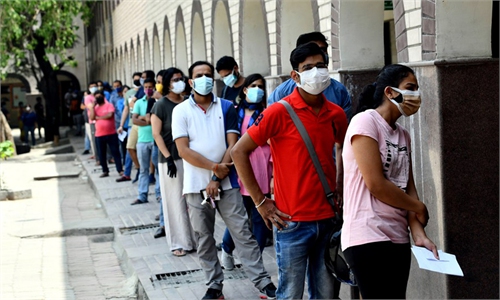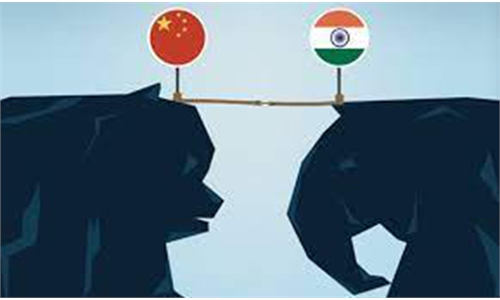
Wi-Fi Illustration: VCG
Imports of Chinese finished electronic products containing Wi-Fi modules have been delayed for months in India, leaving some companies with no way out as the South Asian nation lacks the ability to make these devices and the coronavirus onslaught has disrupted production, a Chinese industry observer familiar with the situation said on Sunday.
The move, together with the Indian government's latest announcement to exclude Chinese telecom companies Huawei and ZTE from a list of participants in its 5G trials, may make India stumble on its economic recovery path as the coronavirus wreaks havoc and variants accelerate the outbreak, a Chinese expert added.
The import delay, including China-made bluetooth speakers, wireless earphones, smartphones, smartwatches and laptops, was first reported by Reuters on Saturday, citing industry sources.
There are more than 80 applications by US, Chinese and South Korean firms pending with the Indian Communications Ministry's Wireless Planning and Coordination Wing, the report said, forcing companies such as China's Xiaomi, Oppo, Vivo and Lenovo, as well as US computer makers Dell and HP, to delay product launches in the fast-growing market.
A long-time electronics industry observer, Michael Qi Yong, confirmed the report. He said that some Chinese companies in India told him that they had not received Wi-Fi modules since October 2020.
"All of the Chinese companies are seeking solutions. For example, they tried to split the finished electronic products and assemble them in India," Qi told the Global Times on Sunday.
However, the Wi-Fi module, a common component in bluetooth speakers and true wireless stereo (TWS) earphones, cannot be made in India due to the country's "immature" industry chain and lack of competence in manual precision work, according to Qi.
"Staff at OnePlus [a Chinese smartphone maker] has asked me to help solve the problem… but now it seems there is no way out. They are stuck," Qi said.
Oppo, Xiaomi, Lenovo and Vivo had not responded to the Global Times' inquiries as of the press time on Sunday.
Despite the import delay, part of the Indian government's strategy to boost India's own manufacturing sector, the country's imports of some China-made devices continue to grow. For example, TWS earbuds grew rapidly in India, with their shipments skyrocketing 723 percent in the third quarter of 2020 compared with a year earlier, according to Counterpoint Research.
What the Indian government ignored is the huge losses for domestic small and medium-sized enterprises (SMEs) that trade the majority of electronic products with Chinese companies, said Liu Zongyi, secretary-general of the Research Center for China-South Asia Cooperation at Shanghai Institutes for International Studies.
These SMEs support many jobs in India so their losses would be a blow to India's economy, which is already suffering from the coronavirus outbreak, Liu said. "[Indian SMES] oppose the trade barriers put up by the government but had nothing to do about them."
Out of political interests, the Indian administration is being "nice" to the West but "hawkish" toward China, Liu pointed out, adding that the aim of citing the so-called national security excuse is to end China's role in India's manufacturing.
"Financial groups in India such as Tata Group and Reliance Group may also be pushing for trade barriers, as they want to march toward the IT sector," Liu said.
Qi added the mounting scrutiny and barriers on Chinese investments in India will unlikely be reduced under the current Indian administration.
After India's announcement excluding Chinese telecoms companies from participating in local 5G trials, a spokesperson for the Chinese Embassy in India said on Wednesday that the Indian government's decision "will not only harm their legitimate rights and interests, but also hinder the improvement of the Indian business environment, which is not conducive to the innovation and development of related Indian industries."
It should be noted that relevant Chinese companies have been operating in India for years, providing massive job opportunities and making contributions to India's infrastructure construction in the telecoms sector, Wang said.
Bilateral trade in goods between China and India in the first quarter surged to $27.7 billion, a year-on-year increase of 42.8 percent, according to data released by the General Administration of Customs of China.
China has also stepped up assistance to India in its fight against the raging virus, with supplies of oxygen generators and other medical devices.
The first batch of oxygen generators made in China has arrived in India and China will continue to provide support to the Indian people, Gao Feng, a spokesperson for the Ministry of Commerce, told a recent press briefing.
India saw the deadliest day of the coronavirus pandemic on Saturday as it registered more than 4,000 confirmed COVID-19 deaths in just 24 hours, according to media reports.




